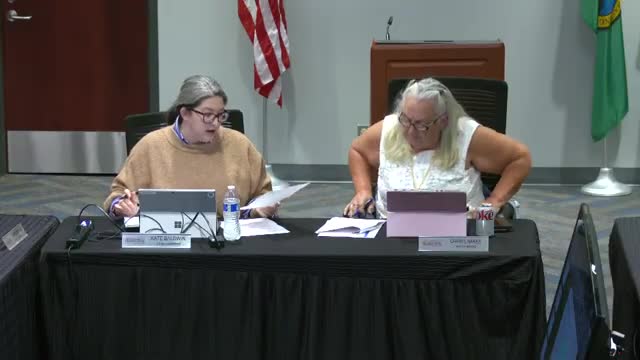Auburn considers 0.1% public‑safety sales tax and mid‑biennial budget adjustments to cover rising criminal justice costs
Get AI-powered insights, summaries, and transcripts
Subscribe
Summary
City staff presented ordinance 7008 to authorize a council‑levied tenth‑of‑one‑percent public‑safety sales tax under HB 2015, estimated to raise about $2.7M/year; staff said compliance with multiple RCW requirements and CJTC review is required before collections could start April 1, 2026 if adopted by Jan. 15.
Director Thomas presented ordinance 7008 at the Nov. 10, 2026 study session, asking council permission to proceed with a council‑imposed point‑one percent (0.1%) sales and use tax for criminal justice and public‑safety purposes under recently enacted state law (House Bill 2015). Thomas said the option is now councilmanic (not voter‑initiated) and that the law allows a broad set of permissible uses including hiring/training/retention of officers, domestic violence services, public defense, diversion and reentry programs, behavioral‑health supports, crisis response and juvenile community placements.
Thomas summarized the statutory eligibility requirements cited in the presentation and said the city must demonstrate compliance with multiple RCW provisions and related policies (presentation cited RCW references in the application materials). The city must apply to the Criminal Justice Training Commission (CJTC) for eligibility review; CJTC has 45 days for initial review, and the process allows up to 180 days to remedy deficiencies. Thomas warned that if Auburn fails to achieve compliance in the statutory period the Department of Revenue could withhold $100,000 of the tax collections until the city demonstrates compliance.
Staff estimated a conservative annual yield of roughly $2.7 million from a locally levied 0.1% rate but added an asterisk that recent state sales‑tax law changes (effective Oct. 1) expanded the taxable base and revenue could differ once collections begin. Thomas described several near‑term needs the tax could offset—rising SCORE jail fees, increased public‑defense contract costs and electronic home monitoring—and proposed adding $2.0 million in 2026 revenue in the mid‑biennial budget amendment to offset those increases. Thomas emphasized that any long‑term spending plan for the tax would be set in the 2027–28 biennial budget process.
Chief Sam Betts and Assistant Chief (identified in the presentation) answered council questions about training completion rates and other operational matters. Betts said many required trainings are already underway or complete and staff will work with CJTC on any outstanding training that CJTC requires; he argued the department’s tactics and SCORE participation have contributed to reductions in crime metrics.
Councilmembers asked about equity and regressivity (one staff estimate translated the tax to roughly $19/year per household under conservative spending assumptions) and about grant opportunities tied to the law; Thomas explained a separate grant program exists for hiring/training with limits (up to 75% of an officer’s salary up to $125,000/year and a 25% local match) and that the city cannot apply for those grants unless the tax authority is in place. Several councilmembers signaled support for using the revenue to maintain public‑safety capacity and technology; others requested more analysis of long‑term spending priorities, the potential to fund alternatives (diversion/treatment/community court), and a review of fiscal sustainability if costs continue to rise.
Staff said to achieve a start of collections on April 1, 2026 the council would need to adopt the ordinance by Jan. 15 and file required notices with the Department of Revenue. No formal vote occurred at the study session; staff said ordinances and budget amendments will be returned for public hearings and potential adoption at the Nov. 17 regular meeting.
Notes: funding estimates, grant rules and statutory timelines were presented by staff at the Nov. 10 study session and are reported here as described in the presentation. The council asked follow‑up questions and requested additional information before a final decision.
